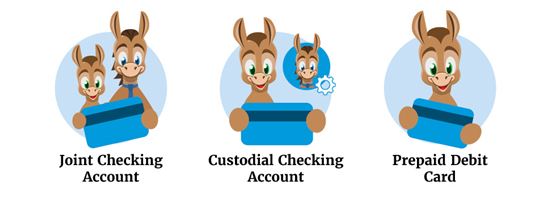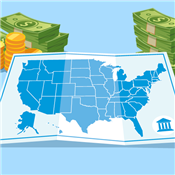Best First Checking Account for Kids
Ad Disclosure: This article contains references to products from our partners. We may receive compensation if you apply or shop through links in our content. This compensation may impact how and where products appear on this site. You help support CreditDonkey by using our links.
Financial literacy doesn't happen overnight. Help your child develop good money habits with these starter checking accounts for kids.
 |
Chase High School Checking℠ - $125 Bonus
- Your teen gets $125 when you open a new Chase High School Checking℠ account together with qualifying activities within 60 days of coupon enrollment
- As a co-owner of the account, you must be present at account opening.
- $0 Monthly Service Fee
- Help your teen build good money habits with their own debit card. Plus, they can add their debit card to their digital wallet.
- With Zelle®, pay and get paid back from friends and family who have an eligible account at a participating U.S. bank. No fees and no waiting for days for money to hit their account.
- You and your teen can stay on top of their account activity by choosing which Account Alerts you both want to sign up for — such as low balance, posted payments, and more.
- Chase makes it easy for your teen to access their money from anywhere with the Chase Mobile® app, plus thousands of ATMs and branches.
- JPMorgan Chase Bank, N.A. Member FDIC
First Checking - 0.10% APY
- Joint checking account for 13-17 year olds
- No fees
- Up to $12 domestic ATM fee reimbursements per month
Most school curriculums don't teach personal finance 101—and it shows.
Without financial education, it's easy to fall into a trap of low savings, debt, and even bankruptcy.
But good habits can be learned, and it helps to start young. Give your child hands-on experience with money by opening their very first checking account.
Here are the top child checking accounts to give your kid a head start on financial wellness.
Joint vs. Custodial vs. Prepaid Accounts
 |
Children under 18 can't open their own checking accounts. But they can share an account with a parent. If you're looking to open a bank account for your kid, you have three options:
- Joint Checking Account
Joint accounts list you and your child as account holders. This is the same idea as a joint account you might hold with your spouse. You and your kid will both be able to deposit and withdraw cash. - Custodial Checking Account
With this type of account, the child is the account holder. The parent just oversees the account as the custodian. Parent permission is needed to access funds until the child is of age (usually 18 or older). Once they reach adulthood, the child gets full control of the account. - Prepaid Debit Card
A prepaid debit card is a great alternative to a bank account for minors. It functions similarly to a checking account, but you have to load it with money before use. Prepaid cards typically don't have a maximum age limit, so kids can use them up until they transition to an adult checking account.
All these account types are great for teaching your kids foundational money habits. It's way easier to understand how to save and spend money when your kid can easily view their cash flow through an app.
Kids often learn best with practice and hands-on experience. Joint accounts can give your child a bit more independence. Custodial accounts can offer more structure if your child needs it. Prepaid cards are more flexible for kids of all ages.
Whichever starter checking account you choose, you'll still be able to keep an eye on your kid's spending habits—and steer them in the right direction to build healthy money habits.
Best Checking Accounts for Kids and Teens
 |
Acorns Early Kids' Debit Card
- Real-time spend notifications.
- Block and unblock cards easily.
- Teach financial independence safely.
All Ages - Banking and Invest in One App
- Flexible controls, spending notifications, in-app chore list
- Age: No minimum age
- Fees: Starts at $5.99/month, per family (up to 5 kids). $10.98/month for Greenlight Max. $15.98/month for Greenlight Infinity. $24.98/month for Greenlight Family Shield.
First Checking - 0.10% APY
- Joint checking account for 13-17 year olds
- No fees
- Up to $12 domestic ATM fee reimbursements per month
Ready to open a bank account for your child? Here are the top checking accounts for kids under 18.
Here are the best starter checking accounts for kids (including teens):
Chase First Banking
Best Overall: Free Account for Kids under 18
Chase First Banking offers one of the best free checking accounts for kids under 18. The account lets your kid access their money online, in store, and at more than 15,000 Chase ATMs.
This bank account teaches kids how to handle money. Kids are encouraged to set savings goals and complete chores to earn an allowance. The app does this without sacrificing parental controls. Parents can set up spending limits and get notifications for all debit card transactions.
Overall, it's a great tool to teach kids how to manage money. But it's not available for everyone. Only current Chase checking members can open this account for their kids. You'll need to link your Chase checking account in order to fund your kid's account.
- Account type: Joint
- Age: 6-17 years old
- Interest: None
- Monthly fees: None
- Daily transaction limits: $100 cash, $400 debit[1]
- Minimum deposit: $50
- Overdraft fees: None
Learn more about Chase First Banking by reading the full review here.
Axos First Checking
Best Interest Checking Account for Teens
Axos Bank offers a great starter checking account. There's no monthly service fee, which is ideal for a first bank account. It's a joint account, so you and your kid will both have equal access. It even earns a little bit of interest to give your teen a taste of real-life adulting.
The account has a daily spending limit to prevent overspending. But the account is forgiving even if your kid makes some mistakes along the way: there are no overdraft or non-sufficient funds fees.
First Checking - 0.10% APY
- Joint checking account for 13-17 year olds
- No fees
- Up to $12 domestic ATM fee reimbursements per month
Axos Bank has a nice, simple app with mobile deposit capabilities. You can turn on notifications to get alerted whenever there's account activity. Plus, Axos is secure. They offer anti-virus and malware protection and 128-bit SSL encryption.
- Account type: Joint
- Age: 13-17 years old
- Interest: 0.10% APY
- Monthly fees: None
- Daily transaction limits: $100 cash, $500 debit[2]
- Minimum deposit: $0
- Overdraft fees: None
Alliant Credit Union Teen Checking
Best Credit Union for Teens
Alliant Credit Union Teen Checking is another joint account with easy mobile access. The app gives insight into how your child is spending money. You'll both be able to view spending habits and see which categories eat up the most money.
The account bears some interest too. All you have to do to qualify is opt into e-statements and make at least one monthly electronic deposit (direct deposit, ATM, or bank transfer) into your child's account. Pretty simple!
Overall, it's a great first bank account with access to 80,000+ free ATMs. And if you need to use out-of-network ATMs, they'll reimburse up to $20 in ATM fees per month. There are no maintenance fees and non-sufficient fund fees.[3]
The account is NCUA-insured (like the FDIC, but for credit unions). You have to become a member to open the Alliant Credit Union Teen Checking account. One way is by becoming an Alliant Credit Union Foundation digital inclusion advocate. Visit their site to learn more about who is eligible to join Alliant Credit Union.
Once your child reaches age 18, the account automatically converts to a regular Alliant Checking Account. You'll remain as a joint owner until your kid removes you.
- Account type: Joint
- Age: 13-17 years old
- Interest: 0.25% APY
- Monthly fees: None
- Daily transaction limits: $500 cash, $500 debit
- Minimum deposit: $0
- Overdraft fees: $0
Chase High School Checking Account
Best for High School Students
If you already have a checking account with Chase, check out the Chase High School Checking Account for your teen. It's a straightforward account that doesn't earn interest. But you get the benefit of a large network of physical branches with in-person support.
The account must be linked with a parent's personal checking account. There are no monthly maintenance fees, and you can set up alerts to keep tabs on your kid's spending. Once your child turns 19, the account converts to a checking account or a college checking account.
You can easily send and receive money with Zelle®. Your child's allowance money can be transferred to their account in just seconds—lucky kid!
- Account type: Joint
- Age: 13-17 years old
- Interest: None
- Monthly fees: None
- Daily transaction limits: depends on the card type[4]
- Minimum deposit: $0
- Overdraft fees: None[5]
Capital One MONEY Teen Checking Account
Best for ATM Access
This joint account from Capital One is perfect if you really want a head start for your child. The Capital One MONEY Teen Checking Account is for kids age 8+. The app comes with parental controls, and you can teach them how to spend and save responsibly. And, there are no fees or minimums to open.
The app also encourages good money decisions, like saving birthday money and allowances for financial goals instead of spending it all.
Your kid will get a taste of financial freedom with the debit card and access to 70,000+ free ATMs. But don't worry! You're still in control with the app for parents. You can set up alerts, lock and unlock the debit card, and more.
Once your teen turns 18, they can move their balance into a regular 360 Checking account or keep it in the Capital One MONEY Teen Checking account.
- Account type: Joint
- Age: 8-17 years old
- Interest: 0.10% APY
- Monthly fees: None
- Daily transaction limits: $500 total purchases/withdrawals
- Minimum deposit: $0
- Overdraft fees: None
Acorns Early Invest
Honorable Mention: Best Investment Account for Kids
Acorns Early Invest is a custodial investment account, not a checking account. But it's worth mentioning if you want to give your kid a head start in investing.
The account helps parents invest on behalf of their kids. Funds in the account can be used for anything as long as that benefits your kid. When your child becomes an adult, the account is easily transferred to your kid.
Acorns Early Invest is part of the Acorns Gold plan, which has a monthly fee of $12/mo.[6] You can add multiple Acorns Early Invest accounts for all your kids at no extra cost. Acorns Gold also includes an investment account, retirement account, checking account for parents, and Acorns Early account for kids.
- Account type: Custodial
- Age: 17 years and younger
- Interest: None
- Monthly fees: $12/mo.
- Daily transaction limits: N/A
- Minimum deposit: $5 to start investing
- Overdraft fees: N/A
$20 Investment Bonus: Easy Investing for Kids
- Set recurring investments, transfer account to child at age 18 or 21
- Age: Any child under 17 years
- Fees: $12/month (price includes multiple kids)
Fidelity Youth Account
Spend and Invest With One Account
Fidelity Youth Account is a unique way for teens to invest and spend money. This is a teen-owned brokerage account owned with a debit card. Parents can send money, monitor account activity, and set up alerts. But the teen ultimately has control over the account.
The app has a learning center to teach teens about spending, saving, and investing. Teens can invest in individual stocks, including fractional shares, or mutual funds. Your kid can start investing with just $1.
To open an account, the parent must have their own Fidelity account. There are no monthly maintenance fees, minimum monthly balance requirements, or ATM fees. Fidelity will automatically offers domestic ATM fee reimbursements.
- Account type: Teen-owned brokerage
- Age: 13-17 years old
- Interest: None
- Monthly fees: None
- Daily transaction limits: N/A
- Minimum deposit: $0
- Overdraft fees: None
Best Prepaid Debit Cards for Kids and Teens
 |
Checking accounts are typically geared toward older kids. Prepaid debit cards can be much more flexible for younger kids than a joint or custodial account. But, you typically will have to pay a monthly fee to get a prepaid card.
Check out the top prepaid cards for kids to attain financial literacy:
Greenlight
Best Prepaid Debit Card for Kids and Teens
Greenlight is a banking app that teaches kids personal finance fundamentals. It helps kids earn interest on their balances, get cash back, and invest all in one platform.
The app offers chores and allowances, savings goals, and customizable spending for kids. Of course, parents are still completely in control through their own app. You can set flexible limits and easily manage your kid's spending habits.
There are four plans to choose from. Each plan covers up to 5 children for one simple monthly fee.
Greenlight Core costs $5.99/mo. and includes a debit card, basic banking services, and a 2% savings reward. Greenlight Max adds investing for parents and kids, protection plans, cash back, and a 3% savings reward for $10.98/mo.
Greenlight Infinity includes everything in Max, plus advanced safety features like location sharing, crash detection, and SOS alerts, along with a 5% savings reward for $15.98/mo.
Greenlight Family Shield, priced at $24.98/mo., extends protection beyond kids to include older family members. It adds account monitoring, identity theft and fraud coverage, real-time safety alerts for added peace of mind, and a 6% savings reward.
- Account type: Prepaid
- Age: No minimum
- Interest: Up to 6% on savings reward
- Monthly fees: $5.99, $10.98, $15.98, or $24.98 per month
- Daily transaction limits: $400 cash,[7] $5,000 debit (per cardholder's account)[8]
- Minimum deposit: $1 by bank transfer, $20 by debit card
- Overdraft fees: None
Current Teen Banking
Best Prepaid Debit Card for Teens
Current Teen Banking is a good stepping stone for older kids to gain more financial freedom. Like most accounts on this list, parents can set boundaries. Kids get convenient access to 40,000+ fee-free ATMs and instant money transfers.
Unlike many of the accounts in this list, Current supports more than one funding source. Multiple family members can conveniently fund your child's account. It makes it easier to co-parent
The Current teen account offers more ways to save with a handy round-up feature and savings pods. Teens can round up purchases and add the difference to their savings goals. It's a hands-off way for older kids to start saving more regularly.
Current doesn't charge any monthly or annual fees for its Teen Account.
- Account type: Prepaid
- Age: 13+ years old
- Interest: None
- Monthly fees: $0
- Daily transaction limits: $500 cash, $3,000 debit,
$3,000 overall spending limit[9] - Minimum deposit: $0
- Overdraft fees: None
Convenient Teen Account With Debit Card
- Easy transfers, set spending limits, automate allowances
- Age: 13 years and older
- Fees: No monthly or annual fee
Acorns Early (formerly GoHenry)
Best Prepaid Debit Card for Kids Under 13
Acorns Early (formerly GoHenry) is a debit card and banking app that teaches kids about financial literacy. The platform is designed for kids ages 6 or older, and it includes fun and entertaining money lessons in the app.
The account lets kids set savings goals, earn allowance through chores, and view a thorough breakdown of their spending. Kids are encouraged to learn through fun, game-like money missions.
Depending on your kid's age, the app provides appropriate and engaging educational content. The topics span a wide scope of important concepts, like budgeting, saving, investing, and entrepreneurship.
Acorns Early costs $5 per month for the individual child. The app also offers an affordable family plan, which is $10 per month and covers up to 4 children. It's a good choice for parents with many children and for those who are searching for a beginner's banking app for their kids.
- Account type: Prepaid
- Age: 6-18 years old
- Interest: None
- Monthly fees: $5/child or $10/family
- Daily transaction limits: $120 cash, $2,500 debit
- Minimum deposit: $5
- Overdraft fees: None
Acorns Early Kids' Debit Card
- Real-time spend notifications.
- Block and unblock cards easily.
- Teach financial independence safely.
FamZoo
Best Prepaid Debit Card for Large Families
FamZoo offers a lot of interesting features for kids. In addition to linked chores and allowances, FamZoo has a few interesting tools to teach kids about real-world finances.
Parents can use family billing to set up recurring charges to kids for expenses like cell phone bills. The app also supports parent-paid interest. This lets you mimic interest on a savings account to show your kid just how powerful compound interest is.
Famzoo costs $5.99 per month per family. There are no limits on family members or cards. If you pay in advance for 24 months, you can get the subscription for just $2.50 per month.[10] If you have multiple children, this is one of the best deals you can find on a kid's prepaid debit card.
- Account type: Prepaid
- Age: No minimum
- Interest: None
- Monthly fees: $5.99/mo.
- Daily transaction limits: $510 cash, $5,000 debit[11]
- Minimum deposit: $0
- Overdraft fees: None
FamZoo Prepaid Card for Kids and Teens
- Order Online
- No Credit Check
- Try for Free
Step Banking
Best for Building Credit
Step Banking is one of the few prepaid cards that can help teens build credit. The Step Visa Card is like a hybrid between a debit card and a credit card. Your child can only spend the amount that's in the account. But each purchase contributes to your kid's credit history.
Like other checking accounts for kids, a Step account lets parents monitor activity. You can also set up account alerts. Beyond that, there aren't a ton of parental controls to limit spending.
Despite the lack of robust parental controls, Step is still a good option for kids and teens. There's no monthly maintenance fee or overdraft fee, and you can't overspend. It's a relatively low-risk way to build credit since you can't rack up debt.
- Account type: Prepaid
- Age: No minimum
- Interest: None
- Monthly fees: None
- Daily transaction limits: depends on Account Limits[12]
- Minimum deposit: None
- Overdraft fees: None
Best Savings Accounts for Kids and Teens
 |
Parents can also open a joint savings account for kids under 18. Minors can withdraw, deposit, and transfer money from a joint savings account.
Here are the best savings accounts for kids and teens:
Alliant Kids Savings Account
Best Interest Rate for Kids Under 13
The Alliant Credit Union Kids Savings Account offers one of the best interest rates in a kid's savings account. This joint account can only be opened for kids 12 years and younger. Once it's open, you can keep the account open as long as you'd like.
The account is best for longer-term savings that your kid won't need right away. Since the savings account earns interest, it's a good way to teach kids about compound interest. The only requirement to get the highest interest rate is to have a balance of at least $100 in the account.
Despite being a digital credit union, Alliant Kids Savings Account offers a lot of flexibility for deposits. You'll get an ATM card and access to 80,000+ ATMs to deposit cash. Checks can easily be deposited through the mobile app.
- Account type: Joint
- Age: 12 years and younger
- Interest: 3.10% on balances above $100
- Monthly fees: None with eStatements opt-in
- Daily transaction limits: $500 withdrawals, $10,000 deposit
- Minimum deposit: $5 (paid by Alliant)
- Overdraft fees: None
Capital One Kids Savings Account
Best Savings Account for Kids Under 18
The Capital One Kids Savings Account is a joint savings account for minors to build long-term savings. Parents can open an account for any child under 18.
The account earns interest to help your kid save a little faster. There are no fees or minimum balance requirements to earn interest.
Kids can log in and check their balance at any time. But only parents can move money in and out of the account. Through the app, you can view your kid's balance, set up automatic savings, deposit checks, and more.
- Account type: Joint
- Age: No minimum
- Interest: 2.50%
- Monthly fees: None
- Daily transaction limits: $5,000 cash deposit
- Minimum deposit: $0
- Overdraft fees: None
How to Choose the Right Account for Your Kid
 |
A checking account is a checking account, right? As long as it keeps your money safe, it'll get the job done.
But there are a few factors you should definitely consider before opening any bank account for your kid or teen:
Your child's age
Depending on your child's age, some accounts might not be available to you. Prepaid cards are usually open to younger kids. Some have no minimum age requirements at all. A regular bank account usually has a minimum age of 13 years old.
Monthly maintenance fee
Many accounts have no monthly maintenance fees. Others might waive the monthly fee if you meet certain requirements. Make sure you can realistically hit those requirements if you don't want your checking account to be as low cost as possible.
Other account fees
Most banks charge some sort of transaction fee. These could include: non-sufficient funds fees, overdraft fees, ATM fees, etc. These are usually avoidable, but it's good to be aware of them anyway.
Insured by FDIC or NCUA
Don't trust a bank or credit union if it isn't backed by the FDIC or NCUA. In case the bank defaults and closes up shop for good, your money will still be safe up to $250,000.[13][14]
Deposits
Is there an easy way to deposit cash or check? Find out how to actually put money into your account. This is mostly an issue for online banks. You probably won't have access to a physical branch that can handle every kind of transaction.
Minimum opening deposit
Most bank accounts for kids have low or no minimum opening deposit. But if it does require a deposit, be sure to have that on hand when you open your account.
Access to funds
Does your bank have an extensive ATM network? If not, does it reimburse fees for out-of-network ATMs? Find out how easy it is for your kid to make cash withdrawals.
If you want to limit your child's spending, be sure to look into parental controls. It'll be great for your peace of mind.
Online vs. traditional
Both types of banks have their merits. Online banks typically have higher APYs and fewer fees. Traditional banks have in-person customer service and large ATM networks. Figure out which features are most important to you and your family.
Mobile banking app
Banking apps offer a wide range of features geared toward different age groups. Some apps are simple and feel more like an adult banking app. Others are more kid-friendly. Learn more about what to look for in a banking app for kids below.
Kid Checking Accounts vs. Teen Checking Accounts
Younger kids and teenagers obviously have different needs. It's important to keep these needs in mind when searching for a bank account for your child.
Helpful Features in Checking Accounts for Kids
Most young kids have very little experience with money management. Accounts for kids should have features that introduce real-world financial concepts.
Checking accounts with chores and allowances let kids earn money even if they're too young to have a job. Interactive savings goals can make saving more fun and approachable. An app with short lessons and videos about personal finance is great for kids of all ages. But these educational tools are especially helpful when you're younger.
In general, look for features that simplify financial topics. Younger kids need checking accounts that offer a lot of guidance and tips for financial responsibility.
Helpful Features in Checking Accounts for Teens
Once your kid becomes a teenager, their first job is on the horizon. The best teen checking accounts have features to help with managing paychecks and setting aside money.
Direct deposit is a great feature to look for in teen checking accounts. Your teen will appreciate the convenience of not having to manually deposit paychecks. It's much easier for your child to track how much money they're making and where it goes.
An account that earns interest is also a good idea for older kids. Teens can appreciate seeing how their account balance grows over time. Look for teen checking accounts with many of the same features you'd like in your own account. At this age, they're ready for a more grown-up account.
Should You Choose a Bank or Credit Union?
Banks and credit unions offer the same types of bank accounts and services. So which should you choose for your child? The biggest difference between the two is ownership. Banks are owned by shareholders, and credit unions are owned by its members.
Credit unions tend to offer better interest rates and lower fees. But you usually have to meet certain requirements to become a member. Banks typically don't have as many hoops to jump through in order to open an account.
Most banks also have better ATM networks since they have a larger national presence. Credit unions tend to serve smaller areas and have smaller ATM networks.
Overall, banks and credit unions are both good options for kid and teen checking accounts. Go with a bank if more ATM and branch access is a priority. Go with a credit union if you'd rather have higher interest rates.
How to Teach Your Child About Money
 |
If you're looking for teenage checking accounts, you're already off to a great start! Here are a few other tips to get the ball rolling in your kid's financial education:
Set a good example
Kids are always watching and learning (even if you don't want them to). Talk to your child about how and why you manage your money. Don't just silently check on your accounts or add to your savings. Bring your kids into the conversation so they can learn from you.
Get them to make savings goals
Help your kid set short-term and long-term financial goals. Does your kid really want the latest video game release? Saving up for the game themselves can help kids truly appreciate the value of a dollar.
Encourage your youngster to set long-term goals too. You can really drive home how important it is to save for the future.
Point out scams and frauds
Young people are savvy, but they're not impervious to identity theft. Teach your kids to watch out for common internet scams and sketchy sites that ask for sensitive information.
Frequently Asked Questions
 |
How do I open a bank account for my child?
You can easily open most kid bank accounts online. Requirements could be a bit different for each account.
Common requirements for bank accounts include:
- Personal information (e.g., full name, address, date of birth, Social Security Number)
- Identification (e.g., birth certificate, driver's license, passport, student ID)
- Minimum deposit amount if applicable
Can an 8 year old have a debit card?
Children under 18 years old can't open their own bank account. However, parents can open a checking account for kids as young as 13. For kids under age 13, a prepaid card is usually the best option. These typically have no or low minimum age requirements.
Every debit card is different, so be sure to check the requirements for each account. To help you get started, read this guide on the best debit cards for kids.
What's the best way to save money for a child?
Parents can choose from many account types to put away money for their children. Here are a few popular options to consider:
- Checking account or debit card for kids
- Children's savings account
- 529 college savings plan
- UTMA, UGMA, or Coverdell ESA custodial account
When should I start a savings account for my child?
You should consider opening a savings account for your kids as soon as they demonstrate an interest in saving money even at a very young age. The best time to open a bank account is when your child is old enough to understand the value of money.[15]
Bottom Line
 |
A first checking account lets your kid get familiar with responsible money management. As a parent, you'll still be there for every step of your child's financial journey. But a bit of financial independence will teach them important money lessons they'll carry into adulthood.
No matter which account you choose, be sure to check in on your child's spending. Most apps encourage good spending and saving habits. But constructive talks with mom and dad can really cement all the great money lessons your kid will learn along the way.
Want to learn more about banking for kids? Check out these articles next:
- Best Banking Apps for Kids and Teens
- Best Debit Cards for Kids
- Is It Too Early to Open a Baby Savings Account?
References
- ^ Chase. Additional Banking Services and Fees, Retrieved 06/24/2024
- ^ Axos Bank. First Checking, Retrieved 06/24/2024
- ^ Alliant Credit Union. Fees, Retrieved 06/24/2024
- ^ Chase. Additional Banking Services and Fees, Retrieved 06/24/2024
- ^ Chase. Chase High School Checking Account Fees, Retrieved 06/24/2024
- ^ Acorns. Pricing, Retrieved 07/01/2024
- ^ Greenlight. Can the Greenlight card be used at an ATM?, Retrieved 10/19/2025
- ^ Greenlight. Are there funding and spending limits for my account?, Retrieved 10/19/2025
- ^ Current. Are there any limits to my Current account?, Retrieved 06/24/2024
- ^ FamZoo. How much do FamZoo prepaid cards cost?, Retrieved 06/24/2024
- ^ FamZoo. Are there any amount or frequency limits on card usage?, Retrieved 06/24/2024
- ^ Step. Are there limits to how much I can withdraw, deposit and send?, Retrieved 06/24/2024
- ^ FDIC. Your Insured Deposits, Retrieved 06/24/2024
- ^ NCUA. How Your Accounts are Federally Insured, Retrieved 06/24/2024
- ^ Consumer Financial Protection Bureau. When's a good age to open a savings account for my child?, Retrieved 06/24/2024
Donna Tang is a content associate at CreditDonkey, a bank comparison and reviews website. Write to Donna Tang at donna.tang@creditdonkey.com. Follow us on Twitter and Facebook for our latest posts.
Note: This website is made possible through financial relationships with some of the products and services mentioned on this site. We may receive compensation if you shop through links in our content. You do not have to use our links, but you help support CreditDonkey if you do.
|
|
|



















